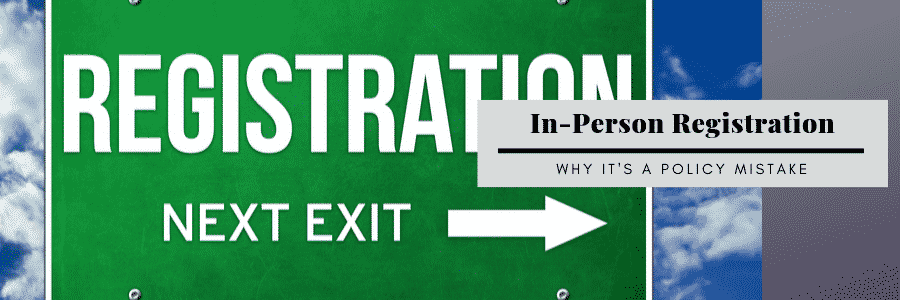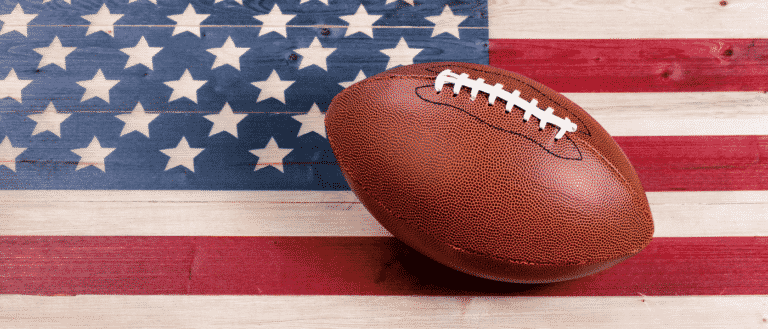States With In-Person Sports Betting Registration

In-person registration is an extinct legal mandate in the US sports betting industry outside of Nevada.
The first states to legalize sports betting after the Supreme Court overturned PASPA in 2018 did so without much legal precedent to guide them.
The repeal of PASPA thrust sports betting legislation onto the desks of state legislators across the country. With so many lawmakers taking a crash course in sports betting, it was not surprising to see policy missteps. However, some policies, like in-person registration, were more consequential than others.
In-person registration, or the Nevada model, was adopted in some capacity by several states (Rhode Island, Iowa, and Illinois) and considered in many others.
Why Some States Required In-Person Registration
Lawmakers explained that the rationale behind in-person registration mandates was three-fold:
1. Age & Identity Verification
Lawmakers and regulators wanted to “get it right” at a time when online sports betting was a novel concept, and there were still widespread concerns regarding identity fraud and underage gambling.
Lawmakers wanted to ensure online sportsbooks could reliably verify customers’ ages and identities.
2. Promoting Responsible Gambling
Concerns about identity verification bled over into responsible gambling.
Lawmakers wanted to ensure that online sportsbooks could limit access to problem gamblers, individuals on self-exclusion lists, and prohibited persons (such as professional athletes).
3. Appeasing Brick-and-Mortar Interests
Industry stakeholders wanted to maintain control over customer acquisition. This was particularly important to high-traffic operators who feared competing casinos in far-flung (less desirable) poaching their customers from across the state thanks to online betting.
In short, some (or likely most) of the push for in-person registration mandates was motivated by self-interest and anti-competitive tendencies.
The Downsides of In-Person Sports Betting Registration
In-person registration mandates caused more problems than they solved, were unfair to smaller casino operators, and frustrated users.
In-Person Registration Was Protectionist
As BettingUSA’s Steve Ruddock explained, the true motivation behind in-person registration was protectionism.
It wasn’t a matter of online betting cannibalizing retail revenue or bringing people to the property. It was about maintaining the status quo and keeping the same distance between the haves and the have-nots.
Advocates for in-person registration would rather see the entire industry take a hit so long as they maintained their positions as alphas.
The real fear was that online gambling is a great equalizer. Remote registration allows every casino, big or small, in a heavily populated or a rural area, the same access to customers.
Rather than compete on equal footing, casinos in heavily populated areas felt they could gain some measure of control regarding the online betting sites people use. They could do this by requiring customers to register in person.
The thinking was that customers within 30 minutes were unlikely to drive several hours to a competitor’s property to register a sports betting account, even if the competitor’s product was superior.
In-person sports betting registration requirements were a shortsighted approach.
Customers’ willingness to travel would have worked against casinos in heavily populated areas, too. Even if a casino in a heavily populated area had the best sports betting app, in-person registration would cancel that out if customers chose convenience.
Unless the product was significantly better, it’s unlikely customers would drive several hours and pass six competitors along the way to register.
In-Person Registration Frustrated Sports Bettors
Another aspect of in-person registration that supporters ignored is how it would impact customer attitudes towards their brands and the legal online sports betting industry.
Bettors forced to drive to a casino to register an online betting account aren’t what you would call “happy customers.” They’re being forced to do something they don’t want to do, and that’s not going to make them giddy about gambling on property or make them suddenly realize how much they love your property and how much they need to keep coming back.
It’s more likely to leave them with a bad taste in their mouths. They had to do something altogether ridiculous (register an online account in person), and they’ll blame the state and the stakeholders.
In-Person Registration Pushes Border Populations to Neighboring States
An in-person registration requirement has an even greater impact on people living near the borders of states that offer remote registration.
Not only will your residents place bets in other states if it’s more convenient, but anyone living on the border in neighboring states without online sports betting, or with the same in-person registration requirement is less likely to choose your state’s operators out of convenience.
Bottom line: Convenience is a critical factor when it comes to where someone is going to place bets.
On-Site Registration Requirements Were A Gift to the Black Market
Bettors can also choose to register an account with a black-market offshore sportsbook.
What advocates for in-person registration failed to see is they already compete with black market online sports betting operators, with or without in-person registration.
By pushing for in-person registration, they increased the appeal of the black market.
And if customers are disgruntled about having to drive to a casino to open an online sports betting account, the black market becomes even more appealing.
In-Person Sports Betting Signup Policies Picks Market Winners and Losers
Finally, in-person registration was an anti-competitive state-sanctioned policy that picked the winners in the market.
In-person registration requirements favored operators in heavily populated areas, increasing their reach while minimizing the reach of smaller, more rural operators.
And by extension, in-person registration ensured that suppliers and platform providers placed a premium on partnerships with casinos in heavily populated areas.
That created a competitive imbalance.
Illinois’ Experience with In-Person Sports Betting Registration
Illinois was the most populous sports betting state to try in-person registration, and it didn’t last long.
The experiment began in 2019 when Illinois passed an imperfect bill.
Among the biggest concerns was the in-person registration requirement. Customers had to sign up at a brick-and-mortar facility before they could bet online in Illinois.
For many Illinois sports bettors, including those in the densely populated Chicago metro area, in-person registration meant driving an hour or more to the nearest sign-up location.
Faced with this barrier, potential customers were likelier to stick with their existing unregulated sportsbooks or bookies.
Ultimately, COVID-related closures in 2020 prompted Illinois to suspend the in-person registration mandate, at first temporarily and later permanently.
“In-person registration is bad for online betting. Period. End of story,” said John Pappas at the time. Pappas is a prominent member of iDEA Growth, a gaming policy advocacy group.
“Even a limited suspension of this requirement is a good thing and Gov. Pritzker should be applauded for taking this step. He could truly make a difference for the future growth of sports betting tax revenues if he advocated eliminating the requirement altogether.
“The evidence is clear that in-person registration is not necessary for a well-regulated market and other states should take notice.”
Rhode Island Also Tried In-Person Registration
A similar situation played out in other states that tried in-person registration, including Rhode Island.
At one point, roughly half the registrants for the state’s lone legal sportsbook completed the physical registration mandate. And that total applied only to those who signed up for accounts in the first place, excluding those who didn’t bother with the legal option.
Rhode Island also ended its in-person registration mandate in response to COVID-related casino closures.
Since Illinois, Iowa, and Rhode Island approved online sports betting in 2019, no state legislature to pass a sports wagering bill has included in-person registration provisions.
Nevada is the Last Holdout
In-person registration is still in place for Nevada sportsbooks.
It’s intended to increase casino foot traffic on the assumption that sportsbook registrants will then wander over to the facility’s bigger revenue generators, such as slots or table games.
But the requirement curtails would-be legal players who either don’t know or don’t care about the legality of their sportsbooks. Instead, these customers often stick with offshore unregulated sportsbooks when forced to register in person.
Nevada regulators considered ending the in-person mandate during a workshop in 2021. , the discussion covered multiple online gambling-related discussions:
A list of 15 suggested changes offered by regulators includes the removal of “provisions limiting interactive gaming to the game of poker,” adding “all games offered on an interactive gaming system,” and amending “authorized player requirements.”
These changes are regulatory, not statutory, which means they can be adopted without new legislation.
Current laws allow the Nevada Gaming Control Board and Nevada Gaming Commission to expand into online casinos and remove the in-person registration requirement to open mobile sports betting accounts.
The law that brought online poker to the Silver State, , authorizes online gambling. It was regulators who decided to limit it to online poker.
As such, it’s regulators who can expand the definition of online gambling to include casino games.
For mobile sports betting to become a reality, regulators need to amend Regulation 5.225 to allow remote ID verification.
Remote Registration Would Be Good for Nevada
Nevada was the first state to legalize sports betting and the first state to offer mobile sports betting. Because it was the first, Nevada casinos took a protectionist approach to online wagering, forcing would-be bettors to register their accounts in person at land-based casinos.
In-person registration is a significant annoyance in Nevada. It forces locals to travel to multiple casinos to register sports betting accounts.
With limited time to spend in the city, visitors will often take the path of least resistance and register an account at the casino-hotel they are staying at.
The in-person registration policy also greatly benefits the bigger casinos on the Strip that see more visitors and get more foot traffic from nearby properties.
Remote registration would benefit locals and visitors and create an equal playing field for the state’s casino operators.
That said, the impact of remote registration in Nevada will be negligible compared to the effects of similar policies in other states, which all saw immediate and substantial increases in betting handle following the removal of in-person registration.








